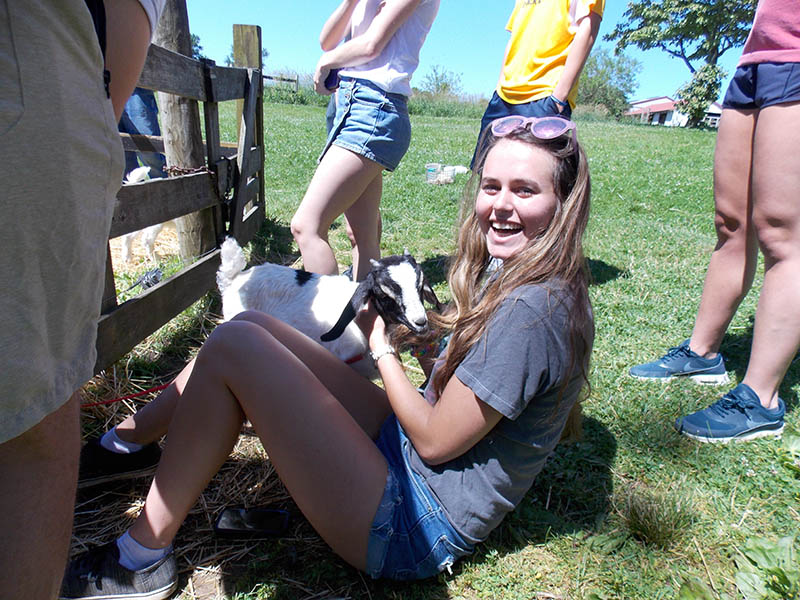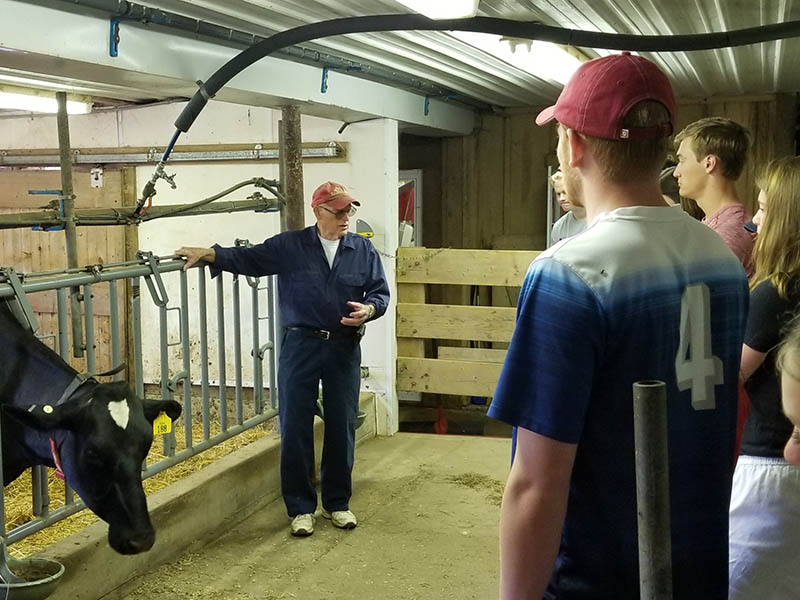A Visit to the Farm Provides One of E2SI’s Many Learning Experiences
In 2018, the Villanova Engineering Entrepreneurship Summer Institute (E2SI) launched with 16 students; in 2019, enrollment grew to 24 with a mix of engineering, business, and arts and sciences majors. Challenging them to develop their problem-solving and creative thinking skills, students in this unique seven-week program learn how to take their ideas from paper to prototype—earning an Engineering Entrepreneurship minor in the process.
Through what is considered by many to be the most rewarding academic experience of their college careers, E2SI (which is also available as a traditional, three-year minor) introduces students to entrepreneurial technologies, business principles and venture planning, not with standard-fare lectures and books, but with first-hand lessons from those who have “been there and done that.” Guest speakers, including motorcycle and mountain bike developer Steve Christini ’95, surgical oncology innovator Patrick Treacy ’87 and Primavera software developer Dick Faris ’69, ’70, share their personal experiences as entrepreneurs. E2SI also takes students off campus for educational field trips that range from exploring the concept of biomimicry at the Philadelphia Zoo to gaining insight into the technical side of operating the television network and flagship shopping channel QVC with the help of Villanova School of Business graduate Erin Sykes ’04.

As an Environmental Science major Layla Defino ’22 asked a number of excellent questions, and connected with the farm animals.

Sam Matthews, co-owner of Milky Way Farm, provided the students with valuable insight into the dairy farm business in the 21st century.
Also among this summer’s field trips was a visit to historic Milky Way Farm in Chester Springs, Pa. In addition to offering these wizened college students an opportunity to embrace the childhood joy of goats, lambs, pigs, cows and kittens, the visit revealed the technological realities and complexities of running a dairy farm in the 21st century. Sam and Melba Matthews, owners of the four-generation family homestead, explained how business, engineering and technology form the nexus of farming today and how sustainability is constantly top-of-mind. While advancements like a robotic milking system have revolutionized daily operations, other challenges remain that students don’t usually consider, including labor shortages (affected by restrictions on immigration), healthcare needs (also impacted by political decisions) and cultural/societal demands for organics (which few small farms can afford to offer).
For Milky Way Farm, while the cows remain in the “center of the wheel,” the spokes that make this small business viable are pumpkin picking (20,000 visitors over five weekends in the fall make this the Farm’s largest source of income), school group tours and summer camps. Milk, which is primarily sold to Land O’ Lakes and Wawa, is the second largest income source.
The on-site Chester Springs Creamery, which technically is a separate business but uses the farm’s milk to make its signature homemade ice cream, also provided lessons for Villanova’s entrepreneurship students. Owner Carolyn Matthews Eaglehouse explained business strategy, including making the decision to sell ice cream by weight, versus by the scoop. She also relayed how events on the other side of the world can play a role, noting that the weather in Madagascar, for example, can have a tremendous effect on the availability of high-quality vanilla.
Throughout the day’s tour, students asked intelligent and probing questions, from the potential for using cow waste as an energy source, to the effects of climate change and the advantages of small farms over larger, industrial operations.
Engineering Entrepreneurship Director Edmond Dougherty says, “Beyond the learning that takes place on these field trips, I hope students find inspiration for their own ideas, particularly those that create value for society.”
